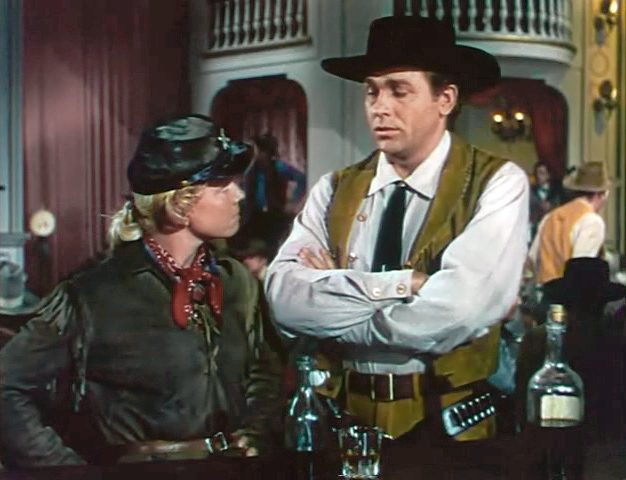America Loses Its Sweetheart, Doris Day
By • May 14, 2019 0 599

News came May 13 that Doris Day — the consummate big band singer and recording vocalist, the shiny, buoyant, blond Hollywood superstar — had died at the age of 97 at her home in Carmel, California.
Doris Day. It’s a resonant name, simple, full of instant imagery and memory. It’s a name easy to spell and easy to succumb to, like the sound of a soft-shoe number.
It’s a lot better than her real name of Doris Mary Ann Kappelhoff, with its weighty Germanic tone, which gives no hint of the light and sunny freshness she brought with her, and to her image on-screen.
She celebrated her birthday only a few months earlier, still in good health, but reportedly succumbed to pneumonia.
How one reacts to her passing depends almost entirely on who and what you were when you began to hear Day, who recorded and performed with big bands like that of Les Brown. Her first influence was Ella Fitzgerald, but she had a voice of her own, recognizable and unique. She could wring a ballad (from the famous “Secret Love” to the more spirited “Sentimental Journey”) of every earned emotion and bring it to the surface.
Whatever fame and stardom she achieved later in the movie industry and Hollywood, she was always respected and ranked high as a singer, without the adornment of the cinematic big brass ring. She was a stylist, musically.
She was a star first with Warner Brothers, who spent less money on their musicals than MGM did, but got quite a lot for their money in the 1950s Doris Day “vehicles,” movies like “On Moonlight Bay,” “By the Light of the Silvery Moon” and the enduring and endearing and energetic “Calamity Jane,” in which she donned a buckskin jacket, a Yankee cap (Union Army, not Bronx Bombers) and six guns, and was smitten with a resistant Wild Bill Hickok, played by Howard Keel, who had become an MGM musical hunk in “Showboat” and “Kiss Me Kate.”
It turned that her Calamity wasn’t a disaster. She cleaned up nicely and came up with “Deadwood Stage” and “Secret Love,” all pop-chart hits before the arrival of rock and roll.
If you were a teenage boy growing up in 1950s America, you sort of seesawed in your affections and daydreams between the wholesome, girl-next-door type that enveloped Doris Day, who had a smile that would make Shirley Jones look glum, and the cinema siren call of Marilyn Monroe, whose appeal was more visceral and direct (if inchoate).
Day herself showed her acting chops in films like the Alfred Hitchcock thriller “The Man Who Knew Too Much,” in which she played a nervously anxious mother opposite James Stewart as her husband, hysterical almost to an abusive extent as they tried to find a missing child. She also sang “Qué Será, Será,” a song that she owned for the rest of her long life.
Day mastered the art of becoming a movie star. She was exceptional in the part of 1920s singer Ruth Etting opposite James Cagney’s gangster in “Love Me or Leave Me,” another thriller called “Julie” and a film version of the Broadway hit “The Pajama Game.” But it was in “Pillow Talk” that Day and her costars would almost invent a type of sex comedy that predated the “Swinging Sixties” ethos, in which Day would portray a sharp businesswoman being pursued by a suave leading man, the object being will-she-or-won’t she. These films and others like them involved a kind of knowing, but also a good-natured tease, with costars like Rock Hudson and James Garner.
These films were also glamorous in terms of fashion, witty in terms of innuendo. Day played them with bravado and smart style, never losing her original appeal. She was funny, she was sharp, always fending off swains that seemed to be boxing below their weight class.
She made lots of movies, and her efforts made her one of Hollywood’s top female stars in terms of box office results. Eventually, that kind of comedy, or the family-styled movies “Please Don’t Eat the Daisies” and a nice “Gaslight”-ish turn in “Midnight Lace” opposite Rex Harrison, which tried to hold up the wobbly edifice of old-style Hollywood, went out of style.
After a good run at a television series, she stopped making movies, appeared in public eyes less and also became a huge champion of animal rights. She raised and praised the character of dogs with her own foundation. She found dogs loyal to fault, and character-wise a patient step above their masters.
Whatever she did, and however she lived, she promoted good humor and optimism. As a singer, she was in a class by herself. Her personal life was something a little darker, and included several husbands, one of whom beat and abused her, another who cheated her out of parts of her considerable fortune. Her son, Terry Melcher, was very much part of the 1960s musical counterculture; he died in his 60s of melanoma.
Born in Ohio, Day became essentially a Californian. You suspect that the movies she made became her without her altogether becoming them. This is probably not true for the rest of us.
The rest of us remember Doris Day, but we still hear her songs, see the bright yellow bobbed hair, the smile, the dance, the affirmation attitude, the glee of joy she projected on the silver screen.

